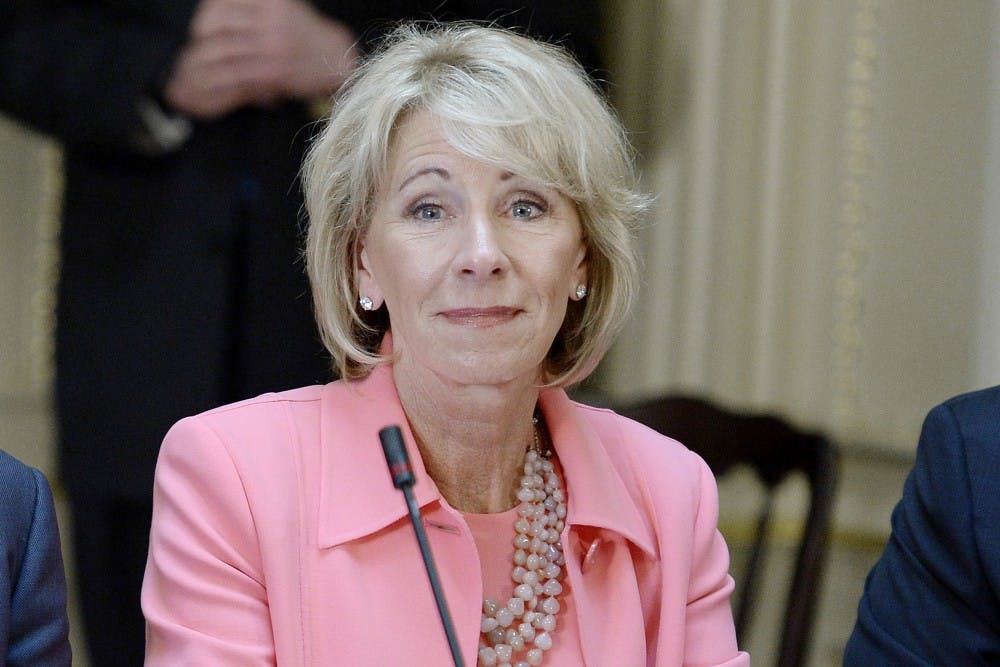The U.S. Department of Education is rescinding guidance on how universities should conduct investigations of sexual assault.
The two hotly contested pieces of guidance — released in 2011 and 2014 under the Obama administration — set expectations for how universities like IU should investigate reports of sexual assault made by students.
The guidance, which set standards of proof to be used by university investigators and time frames for these investigations, were adopted in university policy nationwide. They will now be replaced with a new interim Q&A guide established by the Department of Education.
The announcement came Friday in a press release from the Department of Education’s Office of Civil Rights, which issues federal guidance and evaluates schools’ responses to reports of campus rape.
A letter, also released Friday by the Department of Education, explained the decision to revoke prior guidance: “The 2011 and 2014 guidance documents may have been well-intentioned, but those documents have led to the deprivation of rights for many students — both accused students denied fair process and victims denied an adequate resolution of their complaints.”
U.S. Education Secretary Betsy DeVos announced plans earlier this month to review the Obama-era guidance in a public notice and comment period, repeatedly calling the way schools currently investigate sexual assault “a failed system.”
Friday’s newly released guidance outlines schools’ responsibility to address reports of sexual assault, offer interim measures such as counseling and modified class schedules and conduct equitable investigations led by a trained investigator.
The new guidance does not establish a set time frame for universities to complete their investigations. The previous 60-day time frame established in 2011 guidance was a particular point of controversy, as some argued universities used this guideline as an excuse to rush universities investigations and place sanctions before compiling all evidence.
"This interim guidance will help schools as they work to combat sexual misconduct and will treat all students fairly," DeVos said in the press release. "Schools must continue to confront these horrific crimes and behaviors head-on. There will be no more sweeping them under the rug. But the process also must be fair and impartial, giving everyone more confidence in its outcomes."
This new guidance also called schools to complete sexual assault investigations with a written report summarizing all relevant evidence in a case — including that which could be considered exculpatory to students accused of assault.
IU’s current sexual misconduct policy does not allow students to appeal university findings on a basis of exculpatory evidence found after a case has closed. Administrators told the IDS earlier this month that they are open to considering additional evidence after IU's appeals period ends, but that the University has never overturned a students’ case on appeal after being found responsible in the IU system.
The guidance released Friday also addressed the much-debated preponderance of evidence standard used in university investigations. This standard, lower than the beyond a reasonable doubt standard used in criminal cases, only states that universities must find that a student is more likely than not to have committed an act of sexual violence to sanction them.
The new guidance suggested schools could come to decisions based on the preponderance of evidence standard or a more stringent clear and convincing standard that some schools used prior to the release of 2011 guidance.
Katharine Liell, a Bloomington attorney who has represented dozens of students accused of sexual assault in IU's system, praised the new federal guidance, suggesting the Department of Education is taking a step in the right direction.
"There's a lot of suggestions that Indiana University could implement giving greater protections than are currently afforded to students," Liell said.
She pointed to the University's involvement of all aspects of handling reports of sexual assault — including investigations, deciding sanctions and granting appeals. Liell noted the new guidance allows IU ample opportunity to consider revising this and other aspects of its current sexual misconduct policy, including the training of University officials selected to hear sexual misconduct cases.
"I just don't think when Indiana University plays all roles that anyone would call that impartial," Liell said.
Students who have reported being sexually assaulted worry this change in federal guidance will lead to confusion among schools. Hailey Rial, a former IU-Bloomington student who reported sexual assault as a freshman, said she's concerned this federal shift sends a message to students that their reports of sexual assault don't matter at the University level.
Rial said she sees the positives and negatives in reconsidering evidence standards, but that ultimately schools should refer these types of cases to police.
"Schools are not equipped to handle sexual assault," Rial said. "It's a criminal thing."
IU released a statement Friday afternoon in response to federal changes, reaffirming the University's commitment to ending sexual violence on campus.
"The September 22nd announcement by the Department of Education makes it clear that it remains the responsibility of the University to respond to any matter of possible sexual misconduct," the statement read. "Indiana University will continue to offer and provide support and resources to those who need it; objectively and thoroughly investigate reports; and conduct any related proceedings in a manner that assures due process, as well as fairness and dignity to all participants."
The University's existing sexual misconduct policies already meet the federal guidance issued Friday, according to the IU statement, and the University will look to participate in formal rule-making procedures as the DeVos administration continues its open notice-and-comment period.
The statement also suggested IU will continue to review its own policy as needed.
"The University remains in progress in continuing to update its sexual misconduct policy and procedures whenever necessary," the statement read. "The work to review the policy and procedures cooperatively with staff, faculty, students and experts will continue."
For more on how IU handles cases of sexual misconduct reported to the University, read the IDS investigation team's four-part series on campus sexual assault here.






